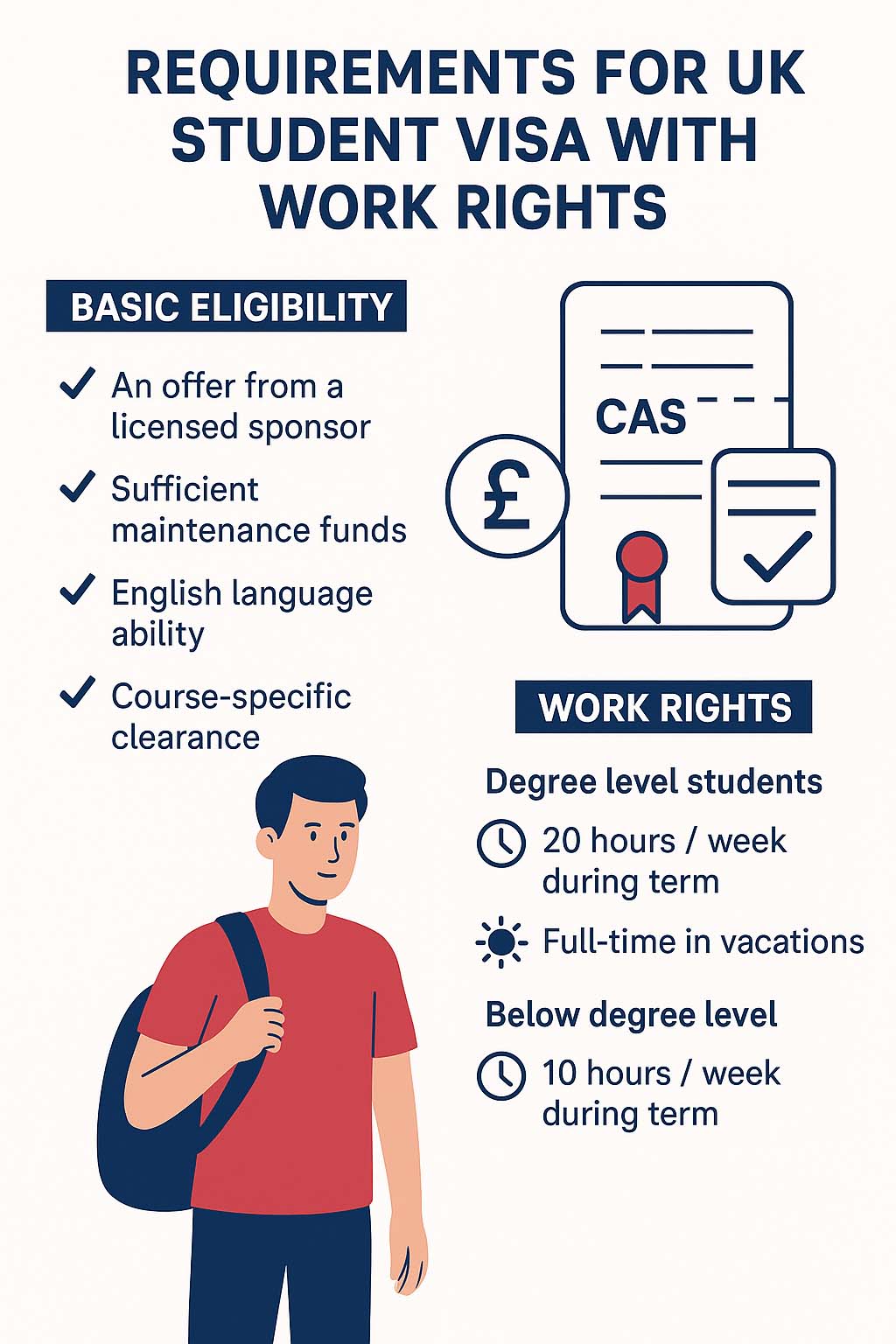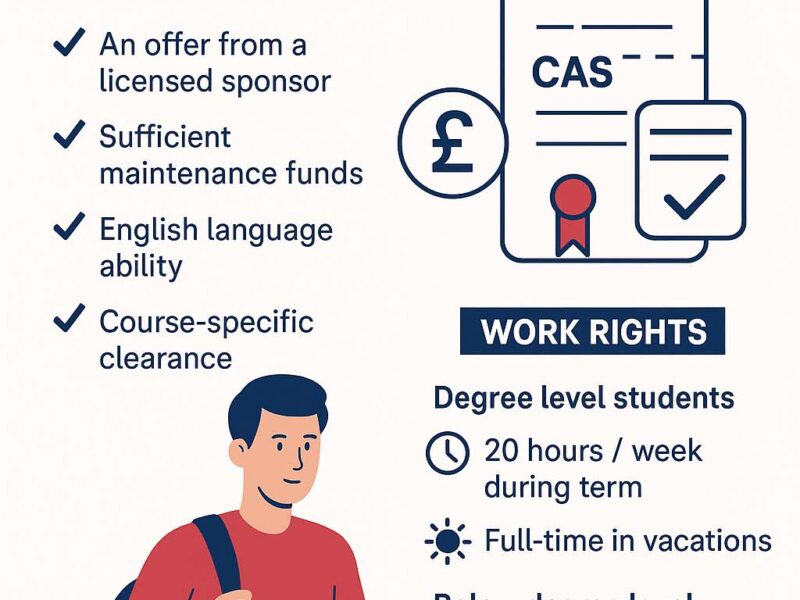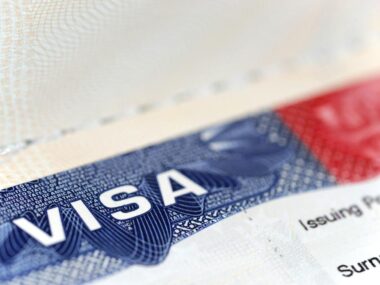REQUIREMENTS FOR A UK STUDENTS VISA
(with a focus on work rights)

What this VISA is and Who it’s for?
The UK Student route (often still called “Student visa”, previously Tier 4) lets non-UK nationals study at a recognised UK educational provider that is licensed to sponsor international students. The route covers further and higher education (including undergraduate and postgraduate degrees), many English language courses and some vocational programmes. You must be 16 or over to apply for a Student visa; under-18s may use the Child Student visa for independent school study. The Student visa also defines what kinds of paid/unpaid work you may do while in the UK. (GOV.UK)
Basic Eligibility
To be eligible for a Student route visa you must normally meet all of the following:
- An offer from a licensed sponsor — you must have an unconditional offer of a place (or conditional where conditions are satisfied) on a course that the sponsor is allowed to teach to sponsored students. Your provider issues a Confirmation of Acceptance for Studies (CAS) — a unique reference you need for your visa application.
- Sufficient maintenance funds — you must show you have enough money to pay outstanding tuition fees and to support yourself for a specified period (the “maintenance” test). The exact amounts depend on whether your course is in London or elsewhere. See section 4 for the numbers and how to prove them.
- English language ability — for degree-level or above courses you must show English ability equivalent to CEFR B2 (for below degree level the requirement is lower — B1). This can be satisfied by tests, prior qualifications, or the sponsor confirming assessment on the CAS depending on circumstances.
- Any course-specific clearance — for some postgraduate science, engineering or technology research/taught courses you must obtain an ATAS (Academic Technology Approval Scheme) clearance certificate before applying.
- TB test (where applicable) — nationals from certain countries must present a TB test certificate from an approved clinic. The GOV.UK pages list affected nationalities.
- Valid passport/ID and biometric information (fingerprints and photo) as part of the online application.
- Payment of fees — visa application fee and the Immigration Health Surcharge (IHS) to access the NHS while in the UK. (The application fee is currently shown on GOV.UK; check the page for the latest figure.)
Confirmation of Acceptance for Studies (CAS)
- A CAS is not a paper letter but a digital record assigned by your sponsoring institution to you. It contains key data (course title, start/end dates, tuition fees due, whether you have to provide evidence of English or finances, etc.). You cannot apply for the Student visa without a CAS issued to you by a licensed sponsor. (Student Administration, The University of Law)
- When you get it: sponsors typically issue CAS once academic and financial conditions are met — often 3–6 months before the course start, but timing varies. Check the sponsor’s guidance and don’t apply too early.
- Accuracy: the CAS must accurately reflect your course and personal details. If anything on your CAS is wrong you must inform the sponsor — errors can lead to refusal.
Financial (maintenance) requirement — how much and proof
One of the most important load-bearing parts of any Student visa is showing you have enough funds.
How much you need to show
As of the most recent Home Office rules (and changes that took effect in early 2025), the maintenance requirement is calculated per month for up to nine months of living costs, and the monthly figure depends on whether you will study inside London (City of London + 32 London boroughs) or outside London:
- In London: £1,483 per month (up to 9 months) = maximum £13,347.
- Outside London: £1,136 per month (up to 9 months) = maximum £10,224.
You must also show proof of payment or outstanding tuition fees (the remainder of the first year’s tuition) unless you are exempt (e.g., already in the UK for 12 months). These figures became effective from January 2025 changes to the maintenance rules.
How the funds are counted
- The Home Office normally requires you to have held the required maintenance funds in your account for at least 28 consecutive days, with the end of that period falling within 31 days of your visa application. (There are exceptions where a student loan or official sponsorship covers this — in which case different evidence is needed.)
- Accommodation offset: if you have already paid certain accommodation fees to your sponsor (e.g., university halls) you may be able to deduct a capped amount from the maintenance requirement — check sponsor guidance and the exact Home Office rules (amounts changed in line with maintenance increases).
Acceptable evidence
- Personal bank statements showing the required balance for the 28-day period.
- A formal student loan letter (dated appropriately) or an official sponsorship letter.
- Proof of payments already made to the university (e.g., receipts of tuition deposit, accommodation payments) for legitimate offsets.
English language requirements — how to meet them
- Degree level or above: CEFR B2 (reading, writing, speaking, listening).
- Below degree level: CEFR B1.
You can prove English ability by:
- Passing a Secure English Language Test (SELT) from an approved provider (e.g., IELTS for UKVI, LanguageCert SELT, PTE SELT, etc.) and providing the SELT reference; or
- Having a degree from a majority-English speaking country and supplying certified evidence; or
- Having your sponsor confirm on the CAS that they have assessed your English to the required level (this is common when the university has already tested you during admission).
Always confirm with your sponsor whether they will assess English for the CAS or whether you must include a SELT result in your visa application.
When ATAS (Academic Technology Approval Scheme) is required
- Who needs ATAS: many postgraduate research and taught courses in science, engineering and certain technology subjects (especially where knowledge could have dual-use national security implications) require an ATAS certificate before you start. The sponsor will tell you if ATAS is required. ATAS must be obtained before you apply for the visa.
- Timing and validity: ATAS certificates are usually valid for 6 months and you should apply well in advance (some universities recommend 3–4 months ahead). If your course or research changes materially, you may need a new ATAS.
Medical (TB) test, biometrics and other checks
- Tuberculosis (TB): nationals of certain countries must present a TB certificate issued within a specific period. Check GOV.UK to see if you need one.
- Biometric enrolment: you will attend a visa application centre to provide fingerprints and a photo (biometric residence permit (BRP) is given/collected in the UK once you arrive or a BRP postal arrival process is specified).
- Criminal record checks: for some courses (e.g., teaching, healthcare) you may need Disclosure and Barring Service (DBS) or similar checks.
Application timing and fees
- Apply: you can apply up to 6 months before your course starts if applying from outside the UK (check exact limits for Short-term Student visas and other variants). The Home Office processing times vary by country and centre; start early.
- Fees: the Student visa application fee (routine figure shown on GOV.UK) and Immigration Health Surcharge (IHS) must be paid at application. The student fee has been around £524 for many applicants when applying from outside the UK (check GOV.UK for the latest fee at the time of application).
Work rights while studying — what you can and cannot do
A. General summary
A Student visa may allow you to work but the exact rules depend on your course level (degree-level vs below degree), your sponsor type, and whether you are in term-time or on official vacation. You must always check your visa vignette/BRP for specific conditions and your CAS for any sponsor-imposed restrictions.
B. Typical permitted hours
- Degree level students (undergraduate/postgraduate taught/research at degree level or above): normally up to 20 hours per week during term-time (the widely used Home Office rule is that degree-level students can work a maximum of 20 hours per week in term-time). During official vacation periods you can normally work full-time. Many universities and UKCISA summarise this as 20 hours/term and full-time during vacations.
- Below degree level and Child Student visa: rules are stricter — for many below-degree courses the limit is 10 hours per week during term time and full-time in vacations; under-18s on Child Student visas typically may work part-time up to 10 hours. Check the exact visa wording.
Important nuance: universities emphasise that the hour limits cannot be averaged over several weeks — the limit applies for any one week (7-day period, usually Monday–Sunday). All paid and unpaid work counts toward this limit, and working for multiple employers does not allow you to exceed the weekly cap.
C. Types of work you cannot do
Even if you have the right to work you are prohibited from certain activities:
- Self-employment (generally not allowed on Student visas).
- Being self-employed, or engaging in freelance professional activity (unless very specific exceptions apply).
- Work as a professional sportsperson or sports coach.
- Employment as an entertainer in some cases (check exact conditions).
- Accessing public funds (benefits) — Student visas prohibit claiming most state benefits.
D. Work placements and internships
- If the course includes a work placement (for example a sandwich year or an assessed internship) you may be allowed to undertake a placement if it is an assessed and integral part of the course — this must be recorded on the CAS and within the sponsor’s rules. If the placement is more than 50% of the course it may affect visa eligibility — check sponsor guidance.
E. Volunteering and unpaid work
- Volunteering: unpaid volunteering usually counts as work for immigration rules (so it may count toward weekly limits). Be cautious — even unpaid positions can be considered employment if they are the same in practice as paid roles. University careers teams and UKCISA provide useful guidance.
F. Employer responsibilities when hiring a student
- Employers must perform right-to-work checks before hiring. A Student visa holder’s BRP (or digital status) will show their work conditions and hours. Employers who hire students must ensure they don’t ask the worker to exceed permitted hours. The Home Office provides guidance to employers on right-to-work checks.
Work during and after the course — special windows
A. Before your course starts
- In many cases students may work full-time in the period before the course starts if they have permission; check GOV.UK and sponsor advice. Some sponsors define pre-course work allowances on the CAS — check specifics.
B. During vacations
- Full-time work is typically allowed during official vacation periods (e.g., summer break) — but what counts as an “official vacation” can be strictly interpreted by the sponsor and the Home Office (e.g., periods when you have no academic responsibilities). Always confirm with your sponsor that the period is indeed classed as a vacation.
C. After course completion but before Graduate visa decision
- If you apply for the Graduate visa from inside the UK, some applicants who have completed their course may be able to work full-time while their Graduate visa application is pending — but this depends on timing and your current leave conditions. Carefully check GOV.UK guidance and university advice before starting full-time work after finishing your studies but before switching.
Switching and post-study options (Graduate route, Skilled Worker etc.)
Graduate route (post-study work)
- The Graduate visa allows eligible international students to stay in the UK to work or look for work after completing an eligible course. For most graduates it lasts 2 years; for PhD or other doctoral graduates it lasts 3 years. You must apply from inside the UK and have completed your course linked to your current Student visa. The Graduate visa is flexible — you can work in most jobs without sponsorship while it lasts, but it cannot be extended (you must switch to another route such as a Skilled Worker visa if you want to remain longer).
Policy note: there have been public policy discussions and proposals to change immigration/post-study rules (including suggestions about shortening the Graduate visa duration and tightening post-study options). These remain proposals until enacted; always verify current rules on GOV.UK. (The Home Office and government periodically consult and issue White Papers which may propose changes.)
Switching to Skilled Worker
- If you find a job meeting Skilled Worker requirements (sponsorship by a licensed employer, appropriate salary, RQF level), you can switch from Student/Graduate to Skilled Worker from inside the UK if eligible. This is the normal route to remain long term and potentially qualify for settlement (subject to the Skilled Worker rules).
Sponsor duties and compliance
Sponsors are required to:
- Assign and maintain CAS records and report to UKVI on student attendance/non-attendance, changes in course or contact details, and when a student fails to enrol.
- Confirm that students meet academic and English requirements before issuing CAS.
- Report changes that affect sponsorship status (e.g., course changes, missed attendance, failure to enrol/complete).
- Keep records and ensure they comply with quality assurance and the Home Office sponsor guidance. Sponsors that fail to comply risk losing their licence. Recent updates to sponsor duties were published as updated guidance in 2025.
Common reasons for refusal (practical red flags)
- Insufficient or incorrectly evidenced maintenance funds (e.g., money not held for the 28-day period).
- CAS inaccuracies or sponsor not being a licensed sponsor.
- Missing required documents (SELT where required, ATAS when needed, TB where applicable).
- Previous immigration breaches/overstays or failure to disclose material facts.
- Sponsor compliance concerns (if the institution’s sponsor licence is suspended or withdrawn).
Practical tips for applicants (step-by-step and checklist)
- Read the sponsor’s visa pages — your university/college international office will have specific guidance and timelines for CAS, ATAS, and documentation. (University of Westminster)
- Begin early — obtain ATAS (if needed), book SELT test slots if required, and arrange funds to satisfy the 28-day rule well in advance. (Student Administration, GOV.UK)
- Use official evidence formats — bank statements, loan letters, or sponsorship letters must meet Home Office format and dating rules. (GOV.UK)
- Keep receipts of tuition deposits and accommodation payments to claim any accommodation offsets. (Cranbrook Legal)
- Check work limits on your CAS and BRP before accepting employment and ask your sponsor if you are unsure whether a period is an official vacation. (University of Dundee)
- If an employer asks you to work beyond permitted hours, politely refuse and explain immigration limits; it can put both of you at risk. Employers can check your status digitally and must comply with right-to-work rules. (UKCISA)
Checklist to submit with your Student visa application
- Completed online visa application and fee payment.
- CAS reference number/details from sponsor.
- Valid passport and previous travel documents.
- Proof of maintenance funds (28-day rule satisfied) and outstanding tuition fees evidence.
- Evidence of meeting English requirement (SELT / CAS statement).
- ATAS certificate (if required).
- TB test certificate (if required for your nationality).
- Any additional sponsor-requested documents or course-related paperwork.
Employer FAQs (hiring students)
- Q: Can I hire a Student visa holder for part-time hours? — Yes, provided you verify their right to work and ensure they do not exceed permitted weekly hours; ask to see their BRP/digital status and confirm the weekly limit shown. Employers should not ask students to exceed limits.
- Q: Can a Student visa holder do freelance or agency work? — Generally no: Student visa holders are not allowed to be self-employed; casual or agency work may be allowed if it is genuine employment and within hour limits, but employers should verify visa wording and legal advice is recommended.
Compliance risks and what to avoid
- Working beyond permitted hours is a breach that can lead to curtailment, refusal of future applications, or removal.
- Working in prohibited roles (self-employment, professional sport) risks enforcement.
- Using dubious evidence (forged bank statements, incorrect loan letters) risks refusal and bans. Always use reputable, official documents.
Recent policy context & what to watch for
Immigration policy is politically sensitive and periodically updated. In 2024–2025 the UK government consulted and published proposals affecting immigration and international students — including debates about post-study work durations and tighter sponsor compliance. While the current official Graduate visa terms remain 2 years (3 for PhD), proposed changes (white papers and consultations) mean students and sponsors should monitor GOV.UK and sector updates. Do not rely on press speculation alone — always confirm via official Home Office pages.
Example timeline for a typical international undergraduate applicant
- 9–12 months before course: apply to universities, gather conditional offers.
- 4–6 months before course: satisfy academic conditions, apply for ATAS if needed.
- 3 months before course: receive unconditional offer, request CAS (sponsor issues CAS once satisfied).
- 2–3 months before course: prepare finances, book SELT if required, collect TB test (if applicable).
- Up to 6 months before course start: submit Student visa application (you may apply up to 6 months before start date from outside the UK).
Final checklist
Must-do before applying:
- Secure unconditional offer / CAS.
- Demonstrate maintenance funds (28-day rule) and clear evidence of any tuition deposits.
- Satisfy English requirement (B2 for degree-level) and obtain SELT or sponsor confirmation.
- Apply for ATAS if your course needs it and check TB requirement.
Remember: the Student visa offers useful work rights which make studying and supporting yourself in the UK possible — but the rights come with strict limits and compliance obligations for both students and sponsors. Read your CAS, check your BRP/digital status carefully, and keep copies of all evidence. If in doubt, consult your university’s international student advice team or an immigration adviser regulated in the UK.

